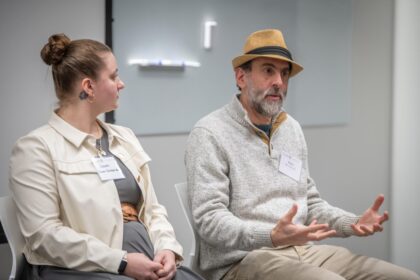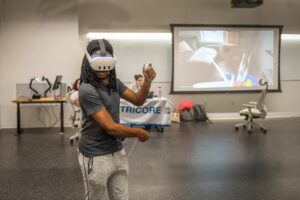Back to school

“I believe virtual reality is going to be integral to the future of education.”
-Mark Jacobs
Mark Jacobs ’89, MFA ’25, was running the Longview School in Brewster, New York, when he began to believe in the “gamification” of education — enhancing learning with interaction classroom games, board games, and digital media.
“We started pioneering the use of games like Minecraft in the classroom,” says Jacobs, who was teaching English, math, and history in addition to his duties as director of the K-12 nonprofit private school. Jacobs’ son, also a teacher at the school, created a curriculum within Minecraft that increased students’ resourcefulness in problem solving and information gathering. History classes included the strategy video game Civilization, in which students are challenged to establish and lead a civilization from the dawn of man into the space age.
“The students would play and compete together while also writing papers and discussing moments in history, the wonders of the world, and some of history’s great leaders,” Jacobs says.

But when Jacobs began incorporating virtual reality (VR) into the classroom, he realized the technology needed more development before it could adequately support students. He decided to fix that himself by returning to his alma mater to pursue an MFA in interactive media at Clark’s Becker School of Design & Technology.
“I started to think that I wanted to be part of the future of designing education in virtual reality or education in the metaverse,” Jacobs says. “I believe virtual reality is going to be integral to the future of education. It’s very immersive, quite designable, able to be gamified.”
Jacobs is among the students working on a multi-discipline project in Central Mexico funded by a $1.5 million grant from the National Science Foundation’s Partnerships for International Research and Education (PIRE) Program. Clark researchers, under the direction of principal investigator Tim Downs, professor in the Department of Sustainability and Social Justice, are using GIS mapping, system dynamics modeling, and extended reality (XR) technology, to help policymakers and the public collectively understand how much is at stake under climate change.
Jacobs, who is working under BSDT Professor Ulm, the project’s co-principal investigator, says the VR aspect of this project is important to help residents and the government better understand how decisions about development could impact water supply in the region.
“I can use the digital media program to pursue my goals of bettering education and the world,” Jacobs says.
Jacobs has also been working as a graduate research assistant for Ulm alongside six undergraduate interns, and the group is creating the new virtual reality lab in the Media Arts, Computing, and Design (MACD) building. Other projects include an immersive theater virtual reality app in which players are the main character in a performance, created by recording movements of Clark students in motion capture suits, and a game in which students can utilize AI animal avatars to assist with reading comprehension and other English language arts skills.
Despite changes to the physical campus, Jacobs says Clark at its core feels the same as when he was an undergraduate.
“I loved being at Clark in the 1980s,” says Jacobs, who transferred to Clark from an engineering school in 1986 after deciding he wanted to major in philosophy.
“I felt like the classes were — and are — phenomenal,” he says. “One of the great strengths of Clark has always been the ability to make connections with professors.”
After receiving his bachelor’s degree, Jacobs earned his master’s in teaching from Manhattanville University in 1994. He then founded the Longview School and stayed at its helm for 22 years before stepping away to enroll in the MFA program.
“I think the lesson that I’ve taken away from Clark, both as an undergraduate and as a graduate, is that learning should be fun,” Jacobs says. “I didn’t think middle school and high school were fun. I was good at it — I could play the ‘education game’ and get good grades — but I didn’t enjoy it.
“When I came to Clark, it was the first time that I loved education and I loved learning,” he adds. “A lot of that has to do with the way Clark approaches education and the opportunities that it gives me. My big takeaway is that I always will find ways to make learning more fun.”



